UNIT 12 INNOVATION LESSON 3课件(共37张,内嵌视频)-高中英语北师大版(2019)选择性必修第四册
文档属性
| 名称 | UNIT 12 INNOVATION LESSON 3课件(共37张,内嵌视频)-高中英语北师大版(2019)选择性必修第四册 |
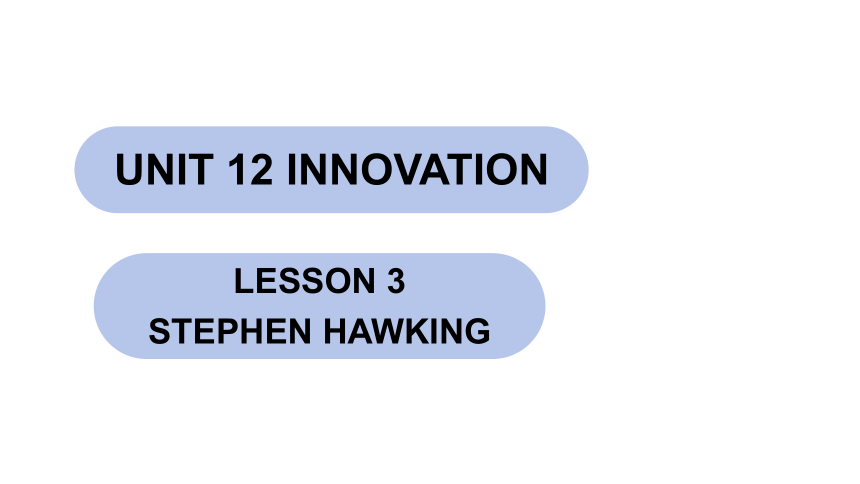
|
|
| 格式 | pptx | ||
| 文件大小 | 17.5MB | ||
| 资源类型 | 教案 | ||
| 版本资源 | 北师大版(2019) | ||
| 科目 | 英语 | ||
| 更新时间 | 2025-04-01 20:36:22 | ||
图片预览

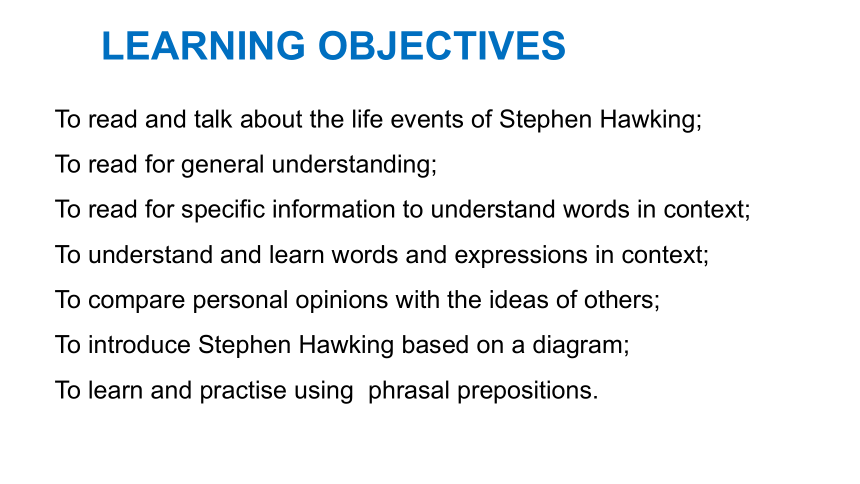
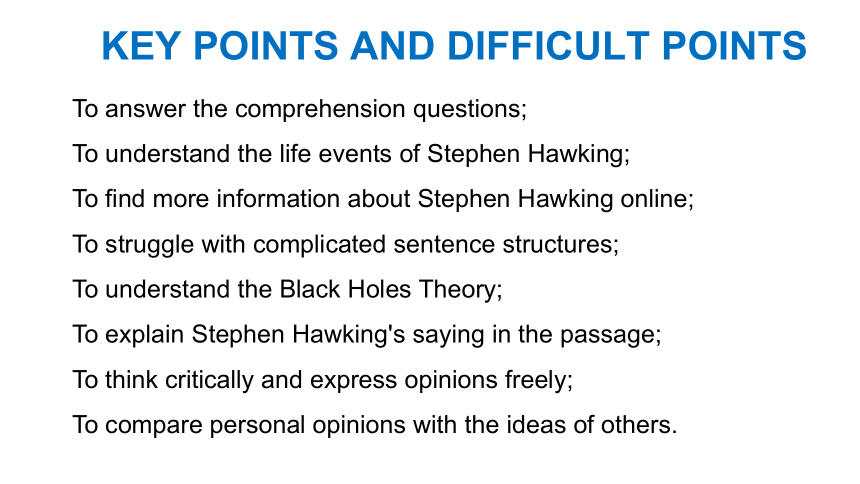
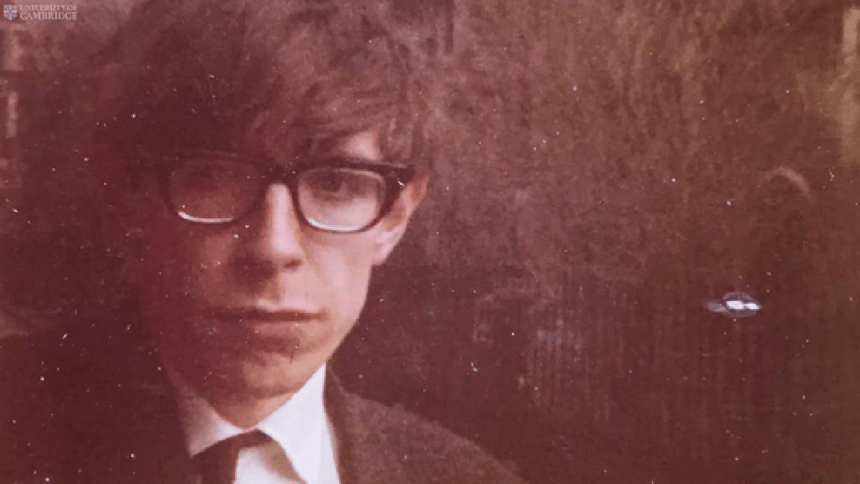
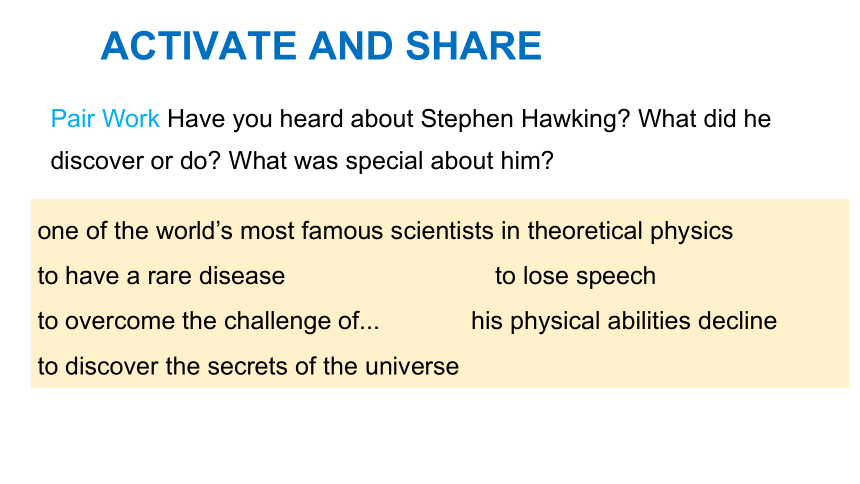
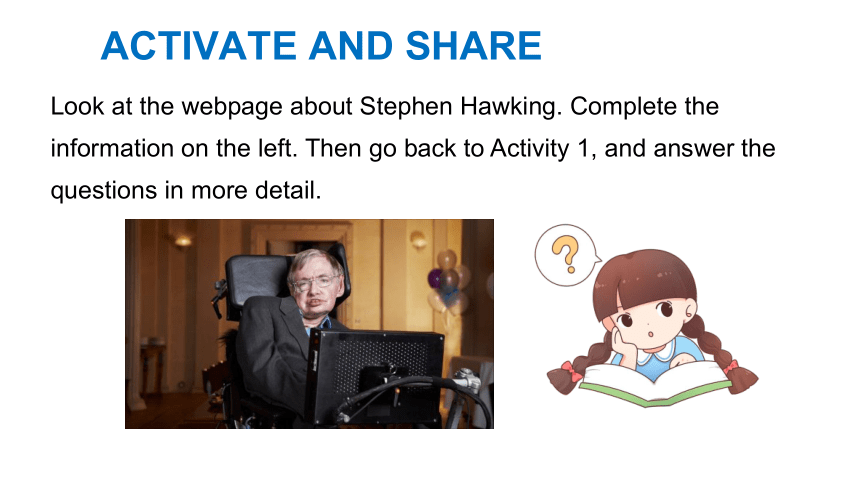
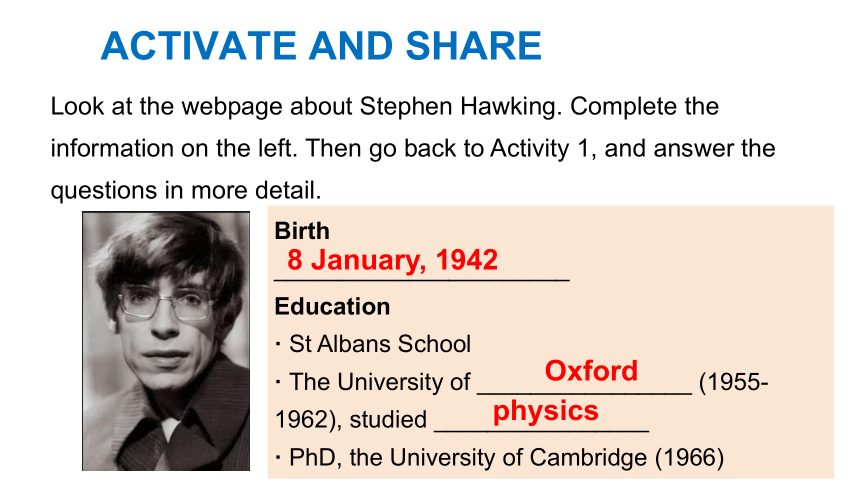
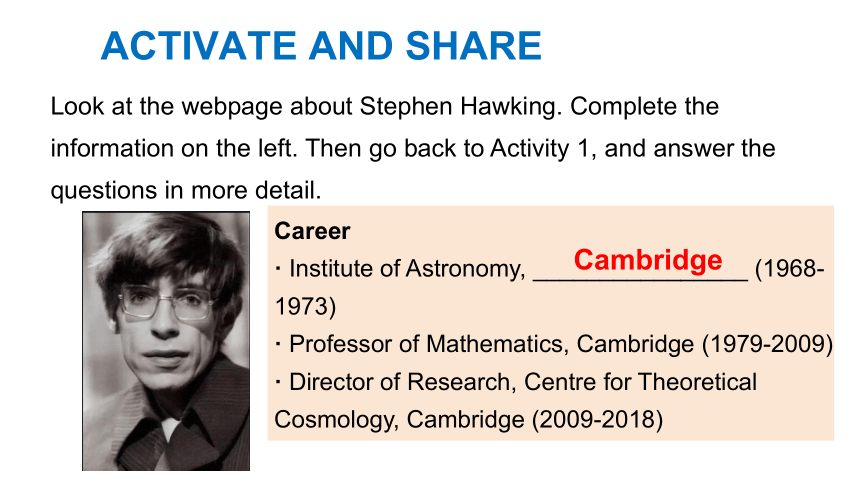
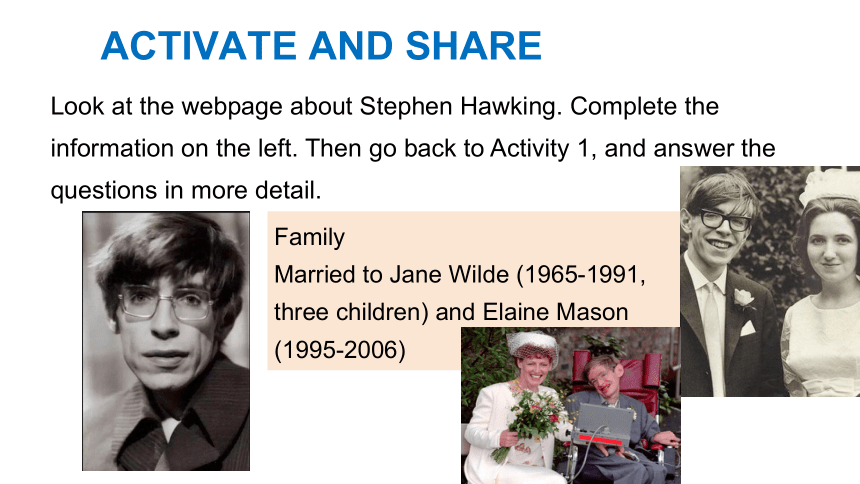
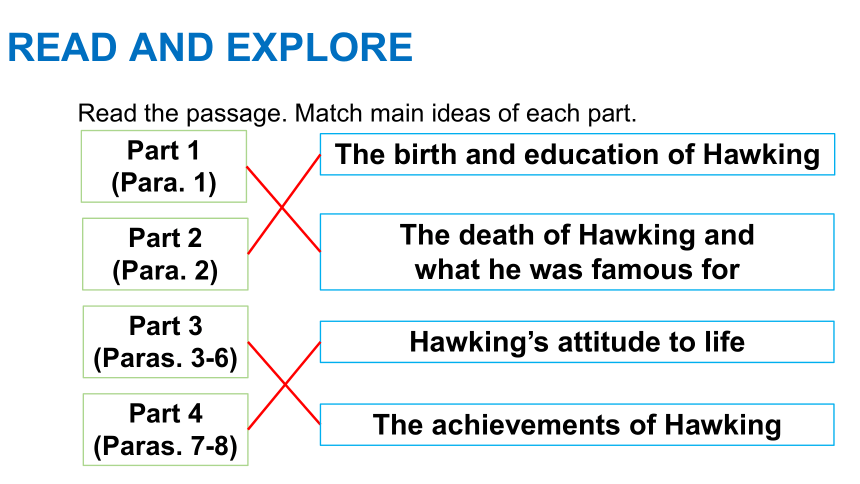

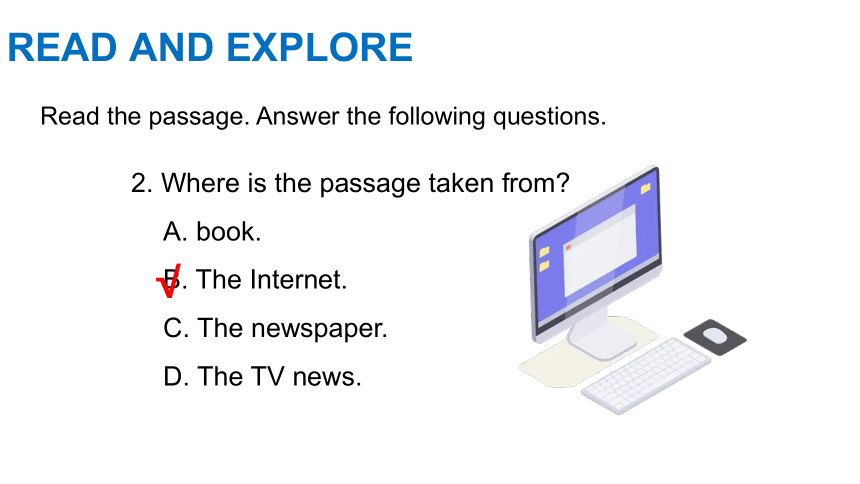
文档简介
(共37张PPT)
LESSON 3
STEPHEN HAWKING
UNIT 12 INNOVATION
LEARNING OBJECTIVES
To read and talk about the life events of Stephen Hawking;
To read for general understanding;
To read for specific information to understand words in context;
To understand and learn words and expressions in context;
To compare personal opinions with the ideas of others;
To introduce Stephen Hawking based on a diagram;
To learn and practise using phrasal prepositions.
KEY POINTS AND DIFFICULT POINTS
To answer the comprehension questions;
To understand the life events of Stephen Hawking;
To find more information about Stephen Hawking online;
To struggle with complicated sentence structures;
To understand the Black Holes Theory;
To explain Stephen Hawking's saying in the passage;
To think critically and express opinions freely;
To compare personal opinions with the ideas of others.
LEADING IN
ACTIVATE AND SHARE
Pair Work Have you heard about Stephen Hawking What did he discover or do What was special about him
one of the world’s most famous scientists in theoretical physics
to have a rare disease to lose speech
to overcome the challenge of... his physical abilities decline
to discover the secrets of the universe
ACTIVATE AND SHARE
Look at the webpage about Stephen plete the information on the left. Then go back to Activity 1, and answer the questions in more detail.
ACTIVATE AND SHARE
Look at the webpage about Stephen plete the information on the left. Then go back to Activity 1, and answer the questions in more detail.
Birth
______________________
Education
· St Albans School
· The University of ________________ (1955-1962), studied ________________
· PhD, the University of Cambridge (1966)
8 January, 1942
Oxford
physics
ACTIVATE AND SHARE
Look at the webpage about Stephen plete the information on the left. Then go back to Activity 1, and answer the questions in more detail.
Career
· Institute of Astronomy, ________________ (1968-1973)
· Professor of Mathematics, Cambridge (1979-2009)
· Director of Research, Centre for Theoretical Cosmology, Cambridge (2009-2018)
Cambridge
ACTIVATE AND SHARE
Look at the webpage about Stephen plete the information on the left. Then go back to Activity 1, and answer the questions in more detail.
Family
Married to Jane Wilde (1965-1991, three children) and Elaine Mason (1995-2006)
READ AND EXPLORE
Read the passage. Match main ideas of each part.
Part 1
(Para. 1)
Part 2
(Para. 2)
Part 3
(Paras. 3-6)
The death of Hawking and
what he was famous for
The birth and education of Hawking
Hawking’s attitude to life
The achievements of Hawking
Part 4
(Paras. 7-8)
READ AND EXPLORE
Read the passage. Answer the following questions.
1. What is the passage mainly about
A. The introduction of Stephen Hawking and his scientific achievements.
B. The analysis of Stephen Hawking’s theory.
C. The description of Stephen Hawking’s books.
D. The introduction of Stephen Hawking’s disease.
√
READ AND EXPLORE
Read the passage. Answer the following questions.
2. Where is the passage taken from
A. book.
B. The Internet.
C. The newspaper.
D. The TV news.
√
READ AND EXPLORE
Read the passage. Answer the following questions.
3. When was Stephen Hawking discovered to suffer from ALS
A. When he was born.
B. When he was studying at the University of Oxford.
C. When he was studying at the University of Cambridge.
D. When he was working at the Institute of Astronomy in Cambridge.
√
READ AND EXPLORE
Read the passage. Answer the following questions.
4. Which of the following is NOT true according to the passage
A. Stephen Hawking was famous for his theory of black holes.
B. Stephen Hawking was the co-author of the book The Grand Design.
C. The book A Brief History of Time: From the Big Bang to Black Holes was popular because it is easy to understand.
D. The book A Briefer History of Time(2005)is easier than the book A Brief History of Time: From the Big Bang to Black Holes.
√
READ AND EXPLORE
Read the passage. Answer the following questions.
5. Which of the following can be used to describe Hawking
A. Optimistic and grateful.
B. Unlucky and miserable.
C. Generous and determined.
D. Humorous and academic.
√
READ AND EXPLORE
Read the passage. Answer the following questions.
6. What is the writing style of this passage
A. Exposition. B. Argumentation. C. Narration.
7. What is Hawking most famous for
A. Himself.
B. His theory in physics.
C. His book—A Brief History of Time.
√
√
READ AND EXPLORE
Read the passage. Answer the following questions.
8. What is the writing order of the passage
A. Space. B. Time-flashback. C. Logic.
9. What big challenge did Hawking face
A. He is unable to walk.
B. He can’t control himself.
C. He is unable to speak.
√
√
READ AND EXPLORE
Read the passage. Answer the following questions.
10. Which order is RIGHT according to the passage
① Going to the University of Oxford.
② Developing a number of new ideas about black holes.
③ Writing the book-A Briefer History of Time.
④ Having an operation.
A. ①②③④ B. ①④②③
C. ①②④③ D. ②①④③
√
READ AND EXPLORE
Read the passage. Write T (true) or F (false) in brackets.
( ) 1. For many people, the book A Brief History of Time: From the Big Bang to Black Holes is hard to understand.
( ) 2. Hawking once considered himself an unlucky man after he got a disease.
( ) 3. Hawking was allowed to do research only rather than teach because of his young age.
T
F
F
READ AND EXPLORE
Read the passage. Write T (true) or F (false) in brackets.
( ) 4. Hawking was famous for his excellent work in theoretical physics and research on ALS.
( ) 5. Hawking developed a number of new ideas about black holes when he was in poor physical condition.
( ) 6. Hawking suggested putting together all the existing ideas.
F
T
F
READ AND EXPLORE
Read the passage. Write T (true) or F (false) in brackets.
( ) 7. At the age of 17, Hawking went to Oxford University to study physics.
( ) 8. Hawking’s main job was teaching at the Institute of Astronomy in Cambridge.
( ) 9. At the opening ceremony of the London 2012 Olympics, Hawking’s speech showed that he was humorous and romantic.
( ) 10. Hawking regarded himself an unlucky man.
T
F
T
F
Introduce Stephen Hawking based on the diagram.
READ AND EXPLORE
Stephen Hawking
Birth
Attitude towards life
Education
Study
illness
Books
ACTIVATE AND SHARE
Stephen Hawking was born in 1942 in Oxford, UK. He liked maths and science best at school. And he was interested in how things work. When he was 21, Stephen got a serious illness. He couldn’t walk or speak. He had to sit in a wheelchair and speak through a computer.
But he didn’t give up.
Introduce Stephen Hawking based on the diagram.
ACTIVATE AND SHARE
Stephen became a great scientist through his hard work. He enjoyed writing. One of his most famous books is A Brief History of Time.
Stephen Hawking was a bright star in the world of science. Sadly, this star went out this March. He died at his home at the age of 76.
Introduce Stephen Hawking based on the diagram.
ACTIVATE AND SHARE
Pair work Read the webpage again. Complete the timeline about Stephen Hawking’s life and work. Then tell each other about him in pairs based on the timeline.
1942
1959
_____
1985
was born
was diagnosed with ALS
1963
went to University of Oxford to study physics
had to have an operation/ lost his speech as a result
ACTIVATE AND SHARE
Pair work Read the webpage again. Complete the timeline about Stephen Hawking’s life and work. Then tell each other about him in pairs based on the timeline.
1988
2005
2012
2018
died
his book A Brief History of Time: From the Big Bang to Black Holes sold one copy for every 750 people on earth
decided to write a simpler version, A briefer History of Time
said to a TV audience of 900 million people at the opening ceremony of London 2012 Olympics: “Look up at the stars and not down at your feet… be curious.”
On 14 March, 2018, one of the world’s most 1. ______________ (influence) scientists, Stephen Hawking, died at his home. He was famous not only for his great achievements but for 2. ________________ (overcome) the challenges of ALS. When Hawking spent his first year at the University of Cambridge, he was diagnosed 3. ________ ALS. He was only expected 4. _________ (live) for a few years. 5. _____________, he finished
Fill in the blanks of the passage.
READ AND EXPLORE
influential
overcoming
with
to live
However
his studies and got a job at the Institute of Astronomy in Cambridge and 6. ______________ (continue) his work in theoretical physics and cosmology. While his reputation for his work spread, his physical ability declined. In 1985, after 7. ____ operation, he started to use a kind of speech-generating equipment specially 8. _____________ (develop) by his doctors to help him speak. But Stephen Hawking never ceased his
Fill in the blanks of the passage.
READ AND EXPLORE
continued
an
developed
studies and continued to develop his theories on black holes.
Hawking believed that he was not an unlucky man. From his diagnosis at the age of 21 he regarded everything since then as a bonus. He was grateful to his family and appreciated the help from a large number of people and 9. _________________ (organization). Though he passed away in the year 2018, his 10. ________________ (persevere) in study and optimistic attitude to life will inspire us forever.
Fill in the blanks of the passage.
READ AND EXPLORE
organizations
perseverance
VOCABULARY
1. overcome
overcome difficulties/ fear/ shyness 克服困难/ 恐惧/ 羞怯
overcome the enemy 战胜敌人
be overcome with sorrow 伤心欲绝
be overcome with joy 喜不自胜
练习:The night before the test I was ______________ by fear and despair.
overcome
VOCABULARY
2. decline
decline to 减少到…… decline by 减少了……
fall/ go into decline 开始衰落
on the decline 在下降 in decline 在衰退中
a rapid/sharp/gradual decline 迅速/ 急剧/ 逐渐下降
decline with thanks 婉言谢绝 ; 婉词谢绝 ; 直言拒绝 ; 谢绝
练习:We need to take corrective action to halt this country's ____________.
decline
VOCABULARY
3. bonus
annual bonus 年终分红 bonus system 奖金制度;分红制
bonus point 红利点;加分;消费积分;奖励积分
year-end bonus 年终奖金,年终额外补贴
bonus tax 奖金税 cash bonus 现金红利
bonus payment 额外津贴
练习:To qualify for the ____________, they must maintain a healthy weight.
bonus
VOCABULARY
4. in spite of
in spite of = despite 尽管、虽然(意思相同,但 despite 更正式,且后面不加 of)
In spite of the fact that 尽管事实是……(后接从句)
In spite of everything 尽管一切
regardless of 不顾;不加理会
练习:We proceeded with the work in spite ______ the coldness.
of
PRACTICE
1. Even today, I would ___________________ (overcome) with sorrow whenever I think of the dog.
2. Libraries are an investment for the future and they should not be allowed to fall into _________________ (decline).
3. That means weight can be hard for individuals to control, which makes the _________________ (bonus) unfair.
4. The arts of China have not declined _________spite of the Western influence.
be overcome
decline
bonus
in
SUMMARY
Talk about and learn the life events of Stephen Hawking;
Read for general understanding;
Read for specific information to understand words in context;
Understand and learn words and expressions in context;
Introduce Stephen Hawking based on a diagram;
Explain Stephen Hawking's saying in the passage;
Compare personal opinions with the ideas of others;
Learn and practise using phrasal prepositions.
Thank you
LESSON 3
STEPHEN HAWKING
UNIT 12 INNOVATION
LEARNING OBJECTIVES
To read and talk about the life events of Stephen Hawking;
To read for general understanding;
To read for specific information to understand words in context;
To understand and learn words and expressions in context;
To compare personal opinions with the ideas of others;
To introduce Stephen Hawking based on a diagram;
To learn and practise using phrasal prepositions.
KEY POINTS AND DIFFICULT POINTS
To answer the comprehension questions;
To understand the life events of Stephen Hawking;
To find more information about Stephen Hawking online;
To struggle with complicated sentence structures;
To understand the Black Holes Theory;
To explain Stephen Hawking's saying in the passage;
To think critically and express opinions freely;
To compare personal opinions with the ideas of others.
LEADING IN
ACTIVATE AND SHARE
Pair Work Have you heard about Stephen Hawking What did he discover or do What was special about him
one of the world’s most famous scientists in theoretical physics
to have a rare disease to lose speech
to overcome the challenge of... his physical abilities decline
to discover the secrets of the universe
ACTIVATE AND SHARE
Look at the webpage about Stephen plete the information on the left. Then go back to Activity 1, and answer the questions in more detail.
ACTIVATE AND SHARE
Look at the webpage about Stephen plete the information on the left. Then go back to Activity 1, and answer the questions in more detail.
Birth
______________________
Education
· St Albans School
· The University of ________________ (1955-1962), studied ________________
· PhD, the University of Cambridge (1966)
8 January, 1942
Oxford
physics
ACTIVATE AND SHARE
Look at the webpage about Stephen plete the information on the left. Then go back to Activity 1, and answer the questions in more detail.
Career
· Institute of Astronomy, ________________ (1968-1973)
· Professor of Mathematics, Cambridge (1979-2009)
· Director of Research, Centre for Theoretical Cosmology, Cambridge (2009-2018)
Cambridge
ACTIVATE AND SHARE
Look at the webpage about Stephen plete the information on the left. Then go back to Activity 1, and answer the questions in more detail.
Family
Married to Jane Wilde (1965-1991, three children) and Elaine Mason (1995-2006)
READ AND EXPLORE
Read the passage. Match main ideas of each part.
Part 1
(Para. 1)
Part 2
(Para. 2)
Part 3
(Paras. 3-6)
The death of Hawking and
what he was famous for
The birth and education of Hawking
Hawking’s attitude to life
The achievements of Hawking
Part 4
(Paras. 7-8)
READ AND EXPLORE
Read the passage. Answer the following questions.
1. What is the passage mainly about
A. The introduction of Stephen Hawking and his scientific achievements.
B. The analysis of Stephen Hawking’s theory.
C. The description of Stephen Hawking’s books.
D. The introduction of Stephen Hawking’s disease.
√
READ AND EXPLORE
Read the passage. Answer the following questions.
2. Where is the passage taken from
A. book.
B. The Internet.
C. The newspaper.
D. The TV news.
√
READ AND EXPLORE
Read the passage. Answer the following questions.
3. When was Stephen Hawking discovered to suffer from ALS
A. When he was born.
B. When he was studying at the University of Oxford.
C. When he was studying at the University of Cambridge.
D. When he was working at the Institute of Astronomy in Cambridge.
√
READ AND EXPLORE
Read the passage. Answer the following questions.
4. Which of the following is NOT true according to the passage
A. Stephen Hawking was famous for his theory of black holes.
B. Stephen Hawking was the co-author of the book The Grand Design.
C. The book A Brief History of Time: From the Big Bang to Black Holes was popular because it is easy to understand.
D. The book A Briefer History of Time(2005)is easier than the book A Brief History of Time: From the Big Bang to Black Holes.
√
READ AND EXPLORE
Read the passage. Answer the following questions.
5. Which of the following can be used to describe Hawking
A. Optimistic and grateful.
B. Unlucky and miserable.
C. Generous and determined.
D. Humorous and academic.
√
READ AND EXPLORE
Read the passage. Answer the following questions.
6. What is the writing style of this passage
A. Exposition. B. Argumentation. C. Narration.
7. What is Hawking most famous for
A. Himself.
B. His theory in physics.
C. His book—A Brief History of Time.
√
√
READ AND EXPLORE
Read the passage. Answer the following questions.
8. What is the writing order of the passage
A. Space. B. Time-flashback. C. Logic.
9. What big challenge did Hawking face
A. He is unable to walk.
B. He can’t control himself.
C. He is unable to speak.
√
√
READ AND EXPLORE
Read the passage. Answer the following questions.
10. Which order is RIGHT according to the passage
① Going to the University of Oxford.
② Developing a number of new ideas about black holes.
③ Writing the book-A Briefer History of Time.
④ Having an operation.
A. ①②③④ B. ①④②③
C. ①②④③ D. ②①④③
√
READ AND EXPLORE
Read the passage. Write T (true) or F (false) in brackets.
( ) 1. For many people, the book A Brief History of Time: From the Big Bang to Black Holes is hard to understand.
( ) 2. Hawking once considered himself an unlucky man after he got a disease.
( ) 3. Hawking was allowed to do research only rather than teach because of his young age.
T
F
F
READ AND EXPLORE
Read the passage. Write T (true) or F (false) in brackets.
( ) 4. Hawking was famous for his excellent work in theoretical physics and research on ALS.
( ) 5. Hawking developed a number of new ideas about black holes when he was in poor physical condition.
( ) 6. Hawking suggested putting together all the existing ideas.
F
T
F
READ AND EXPLORE
Read the passage. Write T (true) or F (false) in brackets.
( ) 7. At the age of 17, Hawking went to Oxford University to study physics.
( ) 8. Hawking’s main job was teaching at the Institute of Astronomy in Cambridge.
( ) 9. At the opening ceremony of the London 2012 Olympics, Hawking’s speech showed that he was humorous and romantic.
( ) 10. Hawking regarded himself an unlucky man.
T
F
T
F
Introduce Stephen Hawking based on the diagram.
READ AND EXPLORE
Stephen Hawking
Birth
Attitude towards life
Education
Study
illness
Books
ACTIVATE AND SHARE
Stephen Hawking was born in 1942 in Oxford, UK. He liked maths and science best at school. And he was interested in how things work. When he was 21, Stephen got a serious illness. He couldn’t walk or speak. He had to sit in a wheelchair and speak through a computer.
But he didn’t give up.
Introduce Stephen Hawking based on the diagram.
ACTIVATE AND SHARE
Stephen became a great scientist through his hard work. He enjoyed writing. One of his most famous books is A Brief History of Time.
Stephen Hawking was a bright star in the world of science. Sadly, this star went out this March. He died at his home at the age of 76.
Introduce Stephen Hawking based on the diagram.
ACTIVATE AND SHARE
Pair work Read the webpage again. Complete the timeline about Stephen Hawking’s life and work. Then tell each other about him in pairs based on the timeline.
1942
1959
_____
1985
was born
was diagnosed with ALS
1963
went to University of Oxford to study physics
had to have an operation/ lost his speech as a result
ACTIVATE AND SHARE
Pair work Read the webpage again. Complete the timeline about Stephen Hawking’s life and work. Then tell each other about him in pairs based on the timeline.
1988
2005
2012
2018
died
his book A Brief History of Time: From the Big Bang to Black Holes sold one copy for every 750 people on earth
decided to write a simpler version, A briefer History of Time
said to a TV audience of 900 million people at the opening ceremony of London 2012 Olympics: “Look up at the stars and not down at your feet… be curious.”
On 14 March, 2018, one of the world’s most 1. ______________ (influence) scientists, Stephen Hawking, died at his home. He was famous not only for his great achievements but for 2. ________________ (overcome) the challenges of ALS. When Hawking spent his first year at the University of Cambridge, he was diagnosed 3. ________ ALS. He was only expected 4. _________ (live) for a few years. 5. _____________, he finished
Fill in the blanks of the passage.
READ AND EXPLORE
influential
overcoming
with
to live
However
his studies and got a job at the Institute of Astronomy in Cambridge and 6. ______________ (continue) his work in theoretical physics and cosmology. While his reputation for his work spread, his physical ability declined. In 1985, after 7. ____ operation, he started to use a kind of speech-generating equipment specially 8. _____________ (develop) by his doctors to help him speak. But Stephen Hawking never ceased his
Fill in the blanks of the passage.
READ AND EXPLORE
continued
an
developed
studies and continued to develop his theories on black holes.
Hawking believed that he was not an unlucky man. From his diagnosis at the age of 21 he regarded everything since then as a bonus. He was grateful to his family and appreciated the help from a large number of people and 9. _________________ (organization). Though he passed away in the year 2018, his 10. ________________ (persevere) in study and optimistic attitude to life will inspire us forever.
Fill in the blanks of the passage.
READ AND EXPLORE
organizations
perseverance
VOCABULARY
1. overcome
overcome difficulties/ fear/ shyness 克服困难/ 恐惧/ 羞怯
overcome the enemy 战胜敌人
be overcome with sorrow 伤心欲绝
be overcome with joy 喜不自胜
练习:The night before the test I was ______________ by fear and despair.
overcome
VOCABULARY
2. decline
decline to 减少到…… decline by 减少了……
fall/ go into decline 开始衰落
on the decline 在下降 in decline 在衰退中
a rapid/sharp/gradual decline 迅速/ 急剧/ 逐渐下降
decline with thanks 婉言谢绝 ; 婉词谢绝 ; 直言拒绝 ; 谢绝
练习:We need to take corrective action to halt this country's ____________.
decline
VOCABULARY
3. bonus
annual bonus 年终分红 bonus system 奖金制度;分红制
bonus point 红利点;加分;消费积分;奖励积分
year-end bonus 年终奖金,年终额外补贴
bonus tax 奖金税 cash bonus 现金红利
bonus payment 额外津贴
练习:To qualify for the ____________, they must maintain a healthy weight.
bonus
VOCABULARY
4. in spite of
in spite of = despite 尽管、虽然(意思相同,但 despite 更正式,且后面不加 of)
In spite of the fact that 尽管事实是……(后接从句)
In spite of everything 尽管一切
regardless of 不顾;不加理会
练习:We proceeded with the work in spite ______ the coldness.
of
PRACTICE
1. Even today, I would ___________________ (overcome) with sorrow whenever I think of the dog.
2. Libraries are an investment for the future and they should not be allowed to fall into _________________ (decline).
3. That means weight can be hard for individuals to control, which makes the _________________ (bonus) unfair.
4. The arts of China have not declined _________spite of the Western influence.
be overcome
decline
bonus
in
SUMMARY
Talk about and learn the life events of Stephen Hawking;
Read for general understanding;
Read for specific information to understand words in context;
Understand and learn words and expressions in context;
Introduce Stephen Hawking based on a diagram;
Explain Stephen Hawking's saying in the passage;
Compare personal opinions with the ideas of others;
Learn and practise using phrasal prepositions.
Thank you
同课章节目录
- Unit 10 Connections
- Lesson 1 How Closely Connected Are We?
- Lesson 2 Community Spirit
- Lesson 3 Anne of Green Gables
- Unit 11 Conflict And Compromise
- Lesson 1 Living In a Community
- Lesson 2 Dealing with Conflict
- Lesson 3 War Memories
- Unit 12 Innovation
- Lesson 1 Scientific Breakthroughs
- Lesson 2 Aha Moment
- Lesson 3 Stephen Hawking
